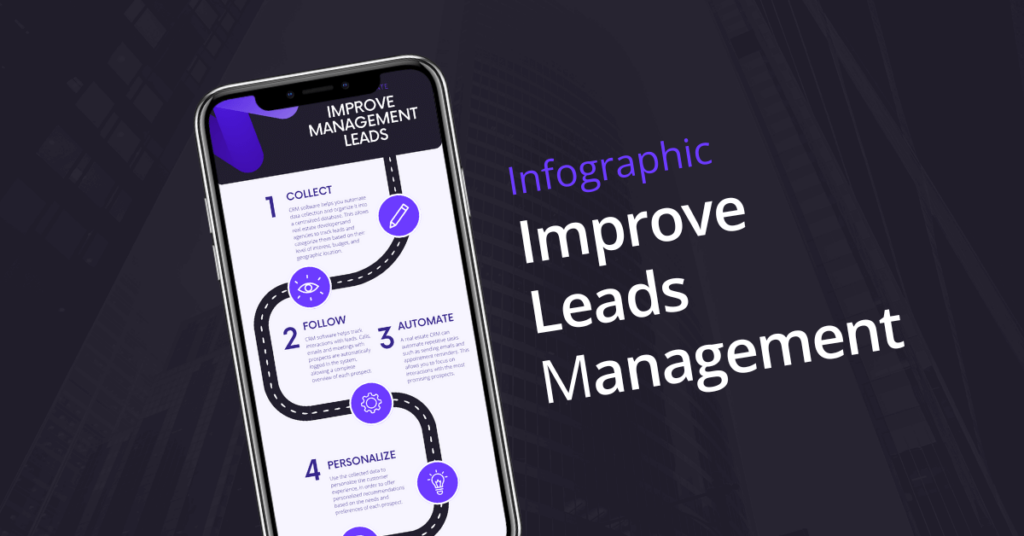Given the circumstances of the last year, we are witnessing a rapid technological advancement in many industries, including real estate. As a result, it is more important than ever for real estate developers to consider making a big digital shift in order to update their methods and thus retain the attention of future purchasers who are evolving at the same pace as these technologies.
Making such a transition may seem rushed or even dizzying to some, which is why it is important to evaluate the primary elements that make up a good real estate CRM before purchasing one. Here are the topics that everyone should consider:
All communications should be automated, not just marketing
To begin with, while most technology providers talk about marketing automation software, the bulk of communications that can and should be automated goes beyond simple marketing communications. A properly configured and integrated marketing automation platform enables its users to greatly improve efficiency from all of their customer facing teams, whether it’s marketing, sales and customer service.
When it comes to efficiency, it is important to first ensure that the software allows customers an easy way to self-register or unsubscribe from specific customer journeys or from all communications altogether, if they wish to do so. This ensures that your consumers are constantly well targeted and that they remain engaged with your marketing content (and makes you that much closer to CASL/CANSPAM compliance). For example, a prospect who is already extremely interested or is in the middle of a sales cycle should not get communications about project promotion. In short, automated mailings must be tailored to the specific needs of each individual; otherwise, they are seen as spammy and unsubscribe rates increase drastically.
Communications automation can also be used to implement automated back-office processes like deposit cheque collections and sales-office visit follow-ups. Having a CRM with an automated system that reminds clients to send their deposit before the due date is definitely more efficient than having someone track and chase late deposit cheques. In this example, the client may receive an email or text reminder around a week before the due date; a second one precisely two days before; and, if the cheque is not received at the end of the day on the due date, call task will be created for the assigned sales representative. This prevents longer than necessary delays in cheque collection, accelerating revenue recognition and construction budget allocation. It should be mentioned that the frequency of reminders may be adjusted to meet the specific demands of each sales team.
Of course, a lot of the value originating from an automated communication solution stems from how it is configured. Onyx helps its customers to apply best practices when implementing customer journeys, enabling customers to build trust with their prospects from the first interaction, substantially facilitating the remainder of the sales process. For this to be possible, messages need to be as personalized as possible, without turning creepy, which means that experience in this endeavour is key when communicating with prospects in an automated fashion.
In the same vein, it is also paramount that the software be able to automate emails or text messages in response to specific events, such as a visit to a sales office or the receipt of a deposit cheque in the mail. This, again, helps build trust without reducing the effectiveness of your sales team.
Automation of sales and rental processes
While automating communications and marketing execution definitely ranks highly on developers’ must-have list, there is even more value to gain from automating the sales process. Real-Estate sales is largely document centric, with preliminary sales agreements, contracts, amendments, warranties, proof of equity, etc. which means that a lot of efficiencies can be gained by digitalizing documents and automating their generation.
Obviously, while engaging with prospects, we must consider the quality of our interactions with them. As a result, it is critical that the software allows tracking of the progress of each sale, whether it is to know if an email was sent to the customer, if they replied or not, if they spoke with a representative on the phone or if they’ve exchanged SMS’es, if they visited the sales office or any other important detail that would be relevant in the sales process. This ensures customers don’t get mixed messages and that their confidence in their choice for a new home remains at its highest.
To make the home buying process as easy and as enjoyable as possible for customers, the right CRM should provide an easy-to-use interface to facilitate documenting a sale or a rental. Therefore, a properly configured “sales/lease generating wizard”, or a guided step-by-step process if you will, makes it simple for sales representatives and customers alike and drastically increases satisfaction of both parties, as well as ensuring the data entered is as complete and error-proof as possible.
While most CRM platforms enable users to see conversations with specific contacts, it should also make it possible to view all conversations related to a specific home, as more than half of residential sales include multiple buyers. This helps to minimize misunderstandings and inconsistencies in the buying process and, while it seems straightforward, most CRM platforms on the market today simply do not support this feature.
It goes without saying that the endgame when considering automation of the home buying process is to enable a move to a fully digital sales office, where contracts are generated on-the-fly and sent for signature in an instant using a trusted e-signature platform. This helps avoid delays and reduce possible errors even further.
Real-time inventory management
While automating the sales process is certainly on every modern home builder/promoter’s wish-list, it is heavily reliant on the fact that inventory needs to be made available in real-time directly within the CRM platform. Developers/Builders/Promoters serious about gaining efficiencies with technology will also want to integrate real-time inventory directly on a project/community website. This enables them to drive an online sales process where customers can reserve/purchase a home directly from their website. This is where having a true real-estate CRM takes most of its value : managing a single source of truth when it comes to inventory, contact and pricing information multiplies the value of technology investments. Modifying a home price from the CRM’s price list should instantaneously update any-and-all websites where this home is listed.
Also, a proper real-estate CRM will keep inventory on items related to the homes being sold; items like parking spots, storage, lockers, cellars, bike racks, etc. By being able to pick and choose add-ons and/or extras from a set inventory and assigning them to a sale, it makes it easy to generate complex sales documents that take every option into account.
This kind of functionality is comforting for both the client and the seller since all of the data linked to the sale contract are provided in one location, getting rid of any uncertainty about the amenities owed and/or selected by the buyer. It should also be available to view the computation of applicable taxes, condo fees, and discounts.
It should be also noted that you may have a hard time finding a CRM that manages this type of inventory, as most of them do not, but Onyx Technologies natively supports related inventory management and does it flawlessly. They also offer to build a high-quality website in order to highlight your real estate project and even allow online sales directly from it.
Prospect management based on projects
While most CRMs do not offer this option, it is worth knowing that it is possible to manage leads based on a particular project. This implies that the software is able to distinguish and categorize each prospect according to the project(s) they were really interested in. This is a valuable feature, as it allows different sales teams to have no visibility into what other sales teams are doing or have done in the past. In other words, it isolates what one sales team is doing just as if every project/community was a separate entity, even though a single contact might use the same email address for every project. More importantly, it gives developers the chance to target potential buyers much more accurately, and with less wasted time.
Integrating Marketing and Sales data through their entire processes
The perfect software should enable tracking of marketing investments from the lead generation to the completion of the sales process to determine the cost per lead, cost per sale, and return on marketing dollars. Keeping tabs on which campaigns generate leads who actually purchase homes is a much better performance indicator than just generating leads that just generate noise for your sales team. While there is some value in measuring the number of leads generated from specific marketing campaigns, spending money on leads that actually convert makes it possible to reduce marketing budgets by as much as 30%, allowing most mid-sized developers to practically pay for their CRM system with these savings alone!
Integration of other real-estate processes and tools
While Marketing and Sales are typically at the forefront of most CRM platforms, systems that integrate a wider range of processes like customer service or post-sales support are the ones that generate more value for their users. Having a natively integrated post-sales process integrated seamlessly definitely multiplies the value of a CRM investment, especially in the real-estate industry.
Having the ability to combine all documents relevant to a sale in a single point that is available, in real-time, to all parties taking part in the transaction makes it undeniably efficient for everyone involved. Documents, in the broader term, include everything from customer identification documents to contracts, schedules, changes, checks, floor plans, updated plans, appliance manuals and warranty cards, and so forth. Providing a portal for customers and partners / contractors to access all of this data drastically reduces the number of calls to customer service / construction departments and makes the buying experience much more efficient and pleasant for customers.
Another emergent aspect of real-estate technology is the ever-growing prevalence of Artificial Intelligence and its uses. Artificial intelligence is progressively making its way into all aspects of sales; for example, Onyx uses AI to recognize ID information and to identify a person in a single step as simple as taking a picture of his/her driver’s license. All of the data is then recognized and filled-in in the blink of an eye. Onyx also uses AI in automated pricing optimization, which uses deep learning algorithms to increase/decrease pricing based on sales velocity and marketing intent.
Other automated tools to look for are post-sales support tools that make the customer experience related to buying a home more interesting and seamless. A great CRM, for example, should provide an easy-to-use interface for new home buyers to choose all design and finishing elements related to their new home in a self-service fashion. These choices usually require a lot of personal reflection from the buyer and he/she will certainly appreciate the fact that he/she can do it himself/herself, at his/her own pace and in a few clicks.
Furthermore, in order to minimize mistakes, the processes that follow these decisions must be incorporated into the whole sales process, and even automated. Creating and signing contracts for options and/or finishes, and collecting payment to make it official, are processes that should simply be integrated in the larger business process. The fact that these transactions can be done remotely makes the process much more efficient and fast. Therefore, the delays for the delivery of special requests will be much shorter and the buyer will be able to ensure that he/she has a property to his/her liking, in time for his/her occupation.
It should be noted that most of our customers have highlighted that the ability to execute automated, mass mailing and communication journeys, like a moving soon customer experience or pre-delivery inspection on a mobile phone or tablet have ranked very high on the “must-haves” list.
Technological integrations
Lastly, the following is an outline of the technological must-haves that must be included in the software you choose:
- It must have 3D project modeling solutions for project presentation.
- It must have a system, such as Docusign, to allow electronic signatures that will make the sales cycle 100% virtual and thus minimize errors and delays.
- It must support VoIP solutions to maximize data completion and launch efficiency.
- It must be able to leverage artificial intelligence to increase efficiency and maximize revenue.
- It must be able to easily integrate with the project website in order to report on the inventory of available units in real time.
- It must integrate all email or text communications sent to customers, even if they are being sent from Gmail/Outlook or a cell phone.
- It must be compatible with any mobile device or tablet.
CONCLUSION
To summarize, if you are a real estate developer and you are thinking of getting a CRM to sell your projects, after having done all the necessary research, it is very likely that your choice will be Onyx Technologies, as it currently stands out in the industry.
If you ever want to know more about what Onyx technologies offers, you can always visit onyxtech.ca. Onyx Technologies’ team is always ready to answer questions or even better, to give you a free demonstration of what their platform can offer.




